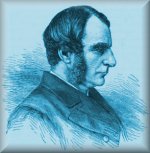 |
The Opening of
"On English Composition
by Charles Kingsley (1819-1875) |
| This is the opening of a speech delivered
to students at Queen's College in 1848, at the beginning of a course on
composition. It is, however, especially the fourth paragraph, extremely
relevant to this course. Think about it as we begin the course. Most of
the rest of the speech is dated, but if you are interested, click
here to read it all. (E.V.) |
An introductory lecture on English composition
is, I think, as much needed as one on any other subject taught in this
College. For in the first place, I am not sure whether we all mean the
same thing when we speak of English composition; and in the next place,
I believe that pupils themselves are very often best able to tell their
teachers what sort of instruction they require. I purpose therefore to-day,
not only to explain freely my intentions with regard to this course of
lectures, but to ask you to explain freely your own wants.
I must suppose, however, that the ladies who
attend here wish to be taught how to write English better. Now the art
of writing English is, I should say, the art of speaking English, and speech
may be used for any one of three purposes: to conceal thought, as the French
diplomatist defined its use; to conceal the want of thought, as the majority
of popular writers and orators seem nowadays to employ it; or, again, to
express thought, which would seem to have been the original destination
of the gift of language. I am therefore, I suppose, in duty bound to take
for granted that you come here to be taught to express your thoughts better.
The whole matter then will very much depend
on what thoughts you have to express. For the form of the symbol must depend
on the form of the thing symbolised, as the medal does upon its die; and
thus style and language are the sacraments of thoughts, the outward and
visible signs of the inward and spiritual grace, or want of grace, in the
writer. And even where language is employed to conceal either thought,
or want thereof, it generally tells a truer tale than it was meant to do.
Out of the abundance of the heart the mouth must speak, and the hollowness
or foolishness of the spirit will show itself, in spite of all cunning
sleights, in unconscious peculiarities or defects of style.
Hence I say style, as the expression of thought,
will depend entirely on what there is within to be expressed, on the character
of the writer’s mind and heart. We all allow this implicitly in the epithets
which we apply to different styles. We talk of a vigorous, a soft, a weak,
a frigid, an obscure style, not meaning that the words and sentences in
themselves are vigorous, soft, weak, or even obscure (for the words and
their arrangement may be simple enough all the while). No, you speak of
the quality of the thoughts conveyed in the words; that a style is powerful,
because the writer is feeling and thinking strongly and clearly; weak or
frigid, because his feelings on the subject have been weak or cold; obscure
to you, because his thoughts have been obscure to himself—because, in short,
he has not clearly imagined to himself the notion which he wishes to embody.
The meaning of the very words “expression” and “composition” prove the
truth of my assertion. Expression is literally the pressing out into palpable
form that which is already within us, and composition, in the same way,
is the composing or putting together of materials already existing—the
form and method of the composition depend mainly on the form and quality
of the materials. You cannot compose a rope of sand, or a round globe of
square stones—and my friend Mr. Strettell will tell you, in his lectures
on grammar, that words are just as stubborn and intractable materials as
sand or stone, and that we cannot alter their meaning or value a single
shade, for they derive that meaning from a higher fountain than the soul
of man, from the Word of God, the fount of utterance, who inspires all
true and noble thought and speech—who vindicated language as His own gift,
and man’s invention, in that miracle of the day of Pentecost. And I am
bound to follow up Mr. Strettell’s teaching by telling you that what holds
true of words, and of their grammatic and logical composition, holds true
also of their aesthetic and artistic composition, of style, of rhythm,
of poetry, and oratory. Every principle of these which is true and good,
that is, which produces beauty, is to be taken as an inspiration from above,
as depending not on the will of man but of God; not on any abstract rules,
of pedant’s invention, but on the eternal necessities and harmony, on the
being of God Himself. |
